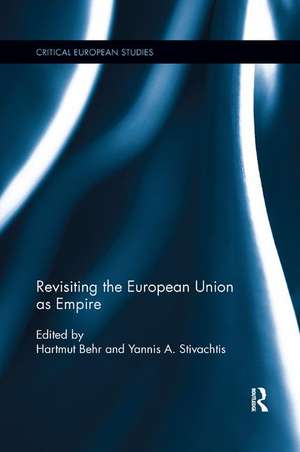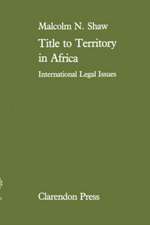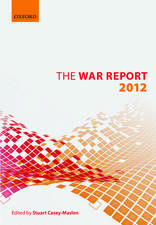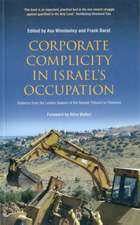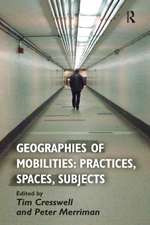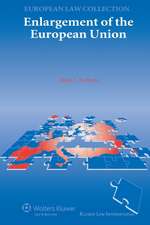Revisiting the European Union as Empire: Critical European Studies
Editat de Hartmut Behr, Yannis Stivachtisen Limba Engleză Paperback – 7 feb 2017
This book unites leading scholars on Europe and Empire to revisit the view of the European Union as an ‘imperial’ power. It offers a re-appraisal of the EU as empire in response to geopolitical and economic developments since 2007 and asks if the policies, practices, and priorities of the Union exhibit characteristics of a modern empire.
This text will be of key interest to students and scholars of the EU, European studies, history, sociology, international relations, and economics.
| Toate formatele și edițiile | Preț | Express |
|---|---|---|
| Paperback (1) | 341.57 lei 6-8 săpt. | |
| Taylor & Francis – 7 feb 2017 | 341.57 lei 6-8 săpt. | |
| Hardback (1) | 1053.92 lei 6-8 săpt. | |
| Taylor & Francis – 2 iul 2015 | 1053.92 lei 6-8 săpt. |
Preț: 341.57 lei
Nou
Puncte Express: 512
Preț estimativ în valută:
65.37€ • 67.99$ • 53.96£
65.37€ • 67.99$ • 53.96£
Carte tipărită la comandă
Livrare economică 14-28 aprilie
Preluare comenzi: 021 569.72.76
Specificații
ISBN-13: 9781138716766
ISBN-10: 1138716766
Pagini: 196
Dimensiuni: 156 x 234 x 20 mm
Greutate: 0.45 kg
Ediția:1
Editura: Taylor & Francis
Colecția Routledge
Seria Critical European Studies
Locul publicării:Oxford, United Kingdom
ISBN-10: 1138716766
Pagini: 196
Dimensiuni: 156 x 234 x 20 mm
Greutate: 0.45 kg
Ediția:1
Editura: Taylor & Francis
Colecția Routledge
Seria Critical European Studies
Locul publicării:Oxford, United Kingdom
Public țintă
PostgraduateCuprins
Introduction European Union: An Empire in New Clothes? Hartmut Behr & Yannis A. Stivachtis 1. EU’s Eastern ‘Empire’ Georgeta Pourchot 2. ‘Empire’, ‘Governing from the Distance’, and the Mitigation of Violence: Towards a Novel Policy Framework for the EU Politics Hartmut Behr 3. The Uses and Misuses of the Imperial Paradigm in the Study of European Integration Jan Zielonka 4. European Union: Imperial Geopolitics and Enforcement Chains József Böröcz 5. European Union, Conditionality and Empire Yannis A. Stivachtis 6. Imagining ‘Europe as an Empire’: Competing/Converging Geopolitical Imaginations and EU Enlargements Aylin Güney 7. Europe’s Post-Imperial Condition Kalypso Nicolaidis & Nora Fisher Onar 8. Linguistic Imperialism of and in the European Union Robert Phillipson 9. Through a Glass, Darkly. The Symbols of European Empire Russell Foster
Recenzii
"This outstanding book does many things. The book begins by connecting the…nineteenth-century critique of Hegel to the emergence of…analytic philosophy. The rejection of Hegel’s philosophy…is then in turn connected to the contemporary emergences of both a political science based on methodological positivism and a reading of Hegel…that separates his political philosophy from its logical and metaphysical antecedents… [It] offers a reading of Hegel’s Encyclopaedia Logic as an attempt to resolve the ancient problem of universals…[and] provides an original account of Hegel’s political philosophy [as a] ‘resolution to the problem of universals in political terms’… [Goodfield] concludes the book by arguing that…our [political] ‘responses to metaphysical problems are inescapably metaphysical’. Thus, it is only through a return to Hegel…that a war of position might be waged.… Goodfield’s phenomenal book deserves to be read closely and taken seriously by philosophers and political scientists, as well as anyone interested in Hegel and his influence on contemporary philosophical discussion."
Matthew Smetona, Assistant Professor in the Intellectual Heritage Program at Temple University, USA.
Matthew Smetona, Assistant Professor in the Intellectual Heritage Program at Temple University, USA.
Descriere
This book unites leading scholars on Europe and Empire to revisit the view of the European Union as an ‘imperial’ power. It offers a re-appraisal of the EU as empire in response to geopolitical and economic developments since 2007 and asks if the policies, practices, and priorities of the Union exhibit characteristics of a modern empire.
